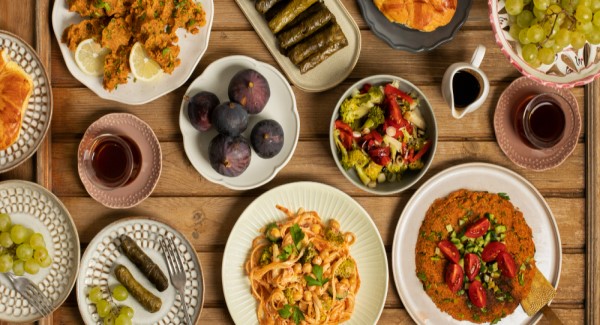
For billions of Muslims around the world, Ramadan is a special time of the year for spiritual rejuvenation and discipline. However, food also plays a key role during Ramadan and when healthy eating is prioritised, the results may include improved metabolism, weight loss and lower cholesterol. However, staying healthy during Ramadan might be a challenge if you tend to break your fast with a feast that could feed an entire football team – including the reserves. So, to be in the best health during this period, here are 5 Ramadan diet tips to help:
1. Hydrate – but not all at once
The first of our Ramadan diet tips just has to be about water. Dehydration can be mean on regular days but when fasting, it’s one of the toughest challenges. However, we’re not camels so loading up on water before dawn is not the answer – you’ll just end up bloated and visiting the bathroom more frequently.
The answer: break down your water consumption. Start with two glasses at iftar and have a glass every hour till bedtime. At suhoor, drink two glasses. This way, you would have had eight glasses overall, which should keep you pretty hydrated during the day. Remember to avoid staying out in the sun when you can and stay away from coffee as it can be dehydrating.
2. Shoo the Sugar
Who doesn’t love sweet stuff? However, this can result in sugar highs and lows which lead to cravings that make your metabolism bounce about like a yoyo. You don’t need sugar’s empty calories as it only results in over-eating.
Steering clear of sugar in its entirety can be a stretch so go for fruits instead and reduce sweet carbonated drinks to a minimum.
3. Make fibre an ally
Can’t say this enough, you can never really go wrong with fruits as they contain the most fibre you can get. Since you’ll be eating just twice a day and 14 hours apart, constipation can be an issue – with the attendant gas making things worse. Adding fibre to your diet will keep your digestive system in tune. Whole grains like millet, ofada rice, fresh fruits and vegetables are just awesome in this regard.
4. Go slow on the oily stuff
Yes, there won’t be a balanced diet without fats and oils – good ones but we usually overindulge – what with all the deep-fried fish and meat, plantains, jollof, puff puff, beans, stews, soups and so on. Cutting the fat during Ramadan affords you an opportunity to unclog your arteries, gut and waistlines of fat.
So instead of frying that chicken or samosa, you can grill and still have a wholesome meal.
5. You can still stay active
You might already have a fairly active lifestyle but there’s a tendency to keep that aside to conserve energy. The good news is you don’t have to. Light exercises like walking, stretching and lifting light weights will make you less lethargic, fitter and alert.
If you haven’t been physically active in the past, start slow and work your way up.
That’s all we have on Ramadan diet tips, we hope they will be helpful to our Muslim brothers and sisters. Ramadan Kareem from all of us at Avon HMO.



